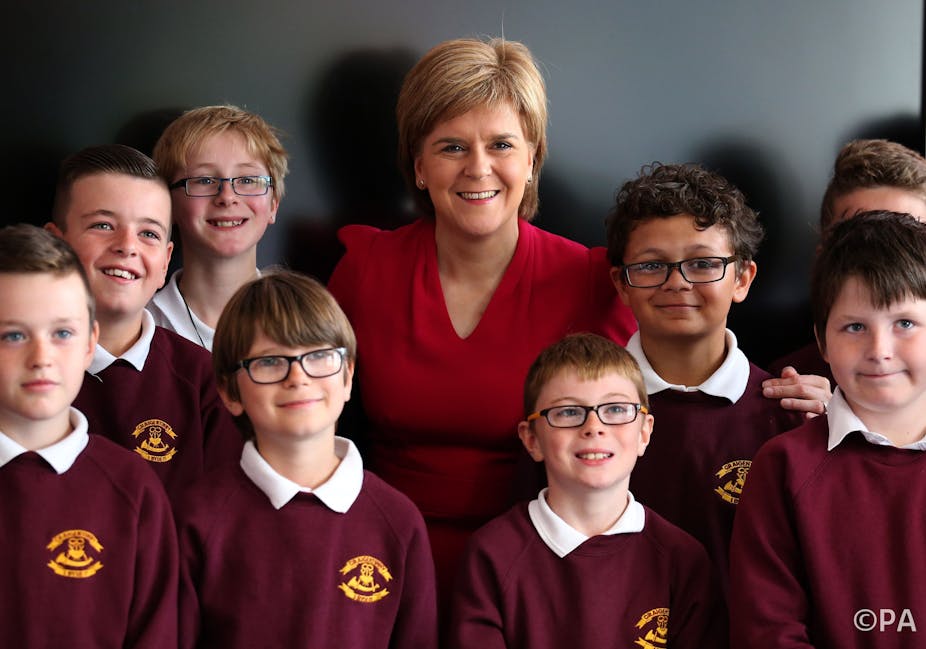How has education fared in Scotland since the SNP was re-elected in 2011? The first thing to say is that the Scottish government has successfully seen through a major curriculum reform. Launched in 2004 under the Labour-Lib Dem administration, the Curriculum for Excellence (CfE) covers all learners from aged three upwards. It seeks to shift the focus away from content and knowledge towards enabling learners to achieve more generic outcomes.
The CfE organises all education around four broad capabilities – aiming to make all pupils “successful learners, confident individuals, responsible citizens and effective contributors” for the rest of their lives. By involving teachers in developing new teaching materials and adopting a rather traditional subject-based focus, the Scottish government for the most part managed to avoid confrontations with teacher unions – albeit there is talk of action over the extra workload pressure on teachers that the CfE has created.
The principles have been accepted by all the major political parties – but is the CfE really a major reform? In 2015 the Organisation for Economic Co-operation and Development positively reviewed the implementation of the Scottish education system, but it also accepted that the Scottish government had not collected the evidence to allow a rigorous evaluation of the initiative itself. It warned that the next stage of the policy would be at risk unless the government rectified this.
Some independent evidence does exist, however. My colleague Mark Priestley, who has been studying the new curriculum since its inception, has found that while most teachers welcomed the underlying philosophy, they have tended to stick to existing practices and retained many features of the previous curriculum. What the OECD praised as “elasticity” was often viewed by teachers as a lack of clarity and focus. Still, in spite of its limitations, I think it is probably fair to mark CfE as a success for the SNP.

Learners great and small
The picture elsewhere is far from perfect and there are difficulties and challenges in every sector – from early years to adult learning. Only higher education seems like an SNP success, at least at first glance. The government has maintained its commitment to free university tuition for all, while cutting grants for the poorest students without anyone much noticing. It has slightly increased university funding to compensate for the absence of fee income and it has managed to push through a reform of university governance, winning the argument against strong opposition (at least by university standards).
But, under the surface, Scottish higher education faces serious challenges. A series of studies have shown that university entry rates for the poorest and the state-educated are significantly below England and Wales. So far, the government has preferred to respond simply by restating its commitment to free tuition.

In early years education, there can be no doubting the Scottish government’s ambitions – but the number of trained specialists working in the sector is falling at a time when demand is expected to rise. I think this has to be classed as making a superficial effort but not actually doing much.
Further education has been put through the mill. Overall funding for colleges has been systematically reduced since 2011 and colleges have been told to prioritise their full-time and higher-education courses for young people. The number of colleges has been reduced from 37 to 20 through a top-down merger programme, intended partly to achieve future efficiency savings of £50m a year from 2016. There have also been strikes over pay levels in colleges. Overall, the SNP policies for colleges look messy.
Although the government published a forward-looking Statement of Ambition on adult learning, in practice it has presided over drastic cutbacks and the adult learning sector has suffered particularly badly as a result of the cuts to college budgets. Part-time student numbers in colleges have fallen by half since 2008. Meanwhile, the government’s freeze on council taxes has meant that local authorities have reduced discretionary spending, including their spending on adult-learning services, and reduced grants to voluntary adult-education providers. The impression of neglect wasn’t helped by a minister who mocked the part-time computing courses that she was closing as “how to click on a mouse”.
So we have a pretty mixed bag – but one that is unlikely to harm the SNP electorally. Whatever its shortcomings in other areas, the party has turned free tuition into a flagship policy, something that is both highly popular and which visibly distinguishes Scotland from England – in nationalist Scotland, that will do nicely.

